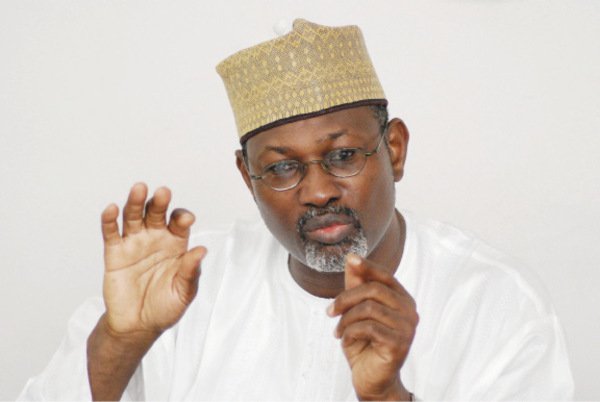Headline
Jonathan, Jega, Nwodo take position on restructuring

A former chairperson of the Independent National Electoral Commission, Attahiru Jega, described as ‘unrealistic’ and ‘a pipe dream” the clamour to return Nigeria to the pre-civil war regional government.
His argument was, however, countered by a former information minister, John Nwodo, with ex-President Goodluck Jonathan also offering a different view on the topic.
According to Premium Times, Mr Jega, a professor of political science, said Nigeria stands to lose more if the existing 36 states structure are to be dismantled in acquiescence to the longstanding call for restructuring the country.Mr Jega spoke at the 18th Daily Trust Dialogue held on Thursday in Abuja and themed “Restructuring: Why? How?”
Upon independence in 1960, Nigeria ran a regional government with three regions, each headed by a premier — in the western, eastern and northern regions. The midwest region was later carved out of the western region, largely in a bid to stave off ethnic crisis. Brewing secessionist agitations made the then federal military government of Yakubu Gowon to divide the four regions into 12 states in 1967, a move made to break the power of the regions.
Subsequent military regimes, punctuated by a devastating civil war and series of coups and counter-coups, increased the number of states till the numbers reached the current 36 in 1996.
However, some Nigerians, especially sociocultural groups, have advocated for a return to the regional model. Mr Jega said the clamour was ill-informed as existing states would nearly never give up their autonomy, and it might plunge the country into another bout of ethnographic tensions.
“In many fundamental respects, creation of states has gone a long way to mitigate real and perceived marginalization of minorities,” Mr Jega argued. “Although given Nigeria’s complex diversity, the more states created, the more their economic viability is threatened; and the more new ‘majorities’ and ‘minorities’ emerged, with fresh demands by the ‘new minorities’ for their own states.
Dangote adbanner 728x90_2 (1)
“The challenges and tensions that would unfold in any attempt to regroup states into regions or into mega 12 states, given that their people have tasted relative autonomy, could only best be imagined. Relative autonomy once gained, is difficult if not near impossible to voluntarily surrender.
“If the major argument against the current 36 state structure is that many seem economically unviable, there are other better ways to address that and make them more viable.
“Improved, (or good democratic) governance, with efficient allocation and utilization of resources, with curtailed corruption, and with greater effort at internal revenue generation, would make virtually all the seemingly unviable states, viable and sustainable.”
Counter opinion
The immediate past president-general of sociocultural group Ohanaeze Nd’Igbo, John Nwodo, who was one of the panellists at the event, would have none of this. He said the 1999 constitution needs to be overhauled because it “was drafted by 47 persons appointed by the then head of state (Abdulsalami Abubakar), 40 of whom were military officers.”
ADVERTISEMENT
Former INEC chairman, Attahiru Jega, speaking at the 18th Daily Trust Dialogue held in Abuja
Mr Nwodo, who was Mr Abubakar’s minister of information, said he “never saw a copy (of the constitution)and never knew who was printing it,” even though his job was to distribute the document to the country.
“We should restructure because the constitutional history of Nigeria shows that the only constitutions of the Federal Republic of Nigeria made by all the ethnic groups in Nigeria, were the 1960 and 1963 Constitutions.
“The 1999 Constitution overthrew the sovereignty of the regions over their national resources and domestic security unleashing in the process an unprecedented fall of education standards, domestic security, and economic well being.
Former President Goodluck Jonathan, who chaired the event, also said restructuring the country alone would not help solve its numerous challenges, rather mind restructuring was the way to go. He noted that Nigerians need to shun mutual suspicion towards one another as some of the challenges faced at the national level are still there at the state and local government levels.
“We cannot restructure without solving issues that polarize us: nepotism, ethnic and religious differences and lack of patriotism,” he said. A cross section of the guests at the 18th Daily Trust Dialogue held in Abuja
“Discussion on restructuring will not help except we restructure our minds. Some of the challenges faced at the national level are still there at the state and local government levels,” he added.
“Take a look at how local government elections are conducted at the state level. Why is it very difficult for an opposition party to win a chairmanship or councillorship seat in a state, despite the fact that the same party probably secured seats in the State Assembly and National Assembly elections, organised by a federal election management body?
“Like every other nation, Nigeria is a project in progress and should confidently discuss her experiences and fashion out solutions to improve on her performance and the well being of all citizens. We should all do our little best in our little corners to overcome the challenges we face, and work hard to reposition our country for a greater and more prosperous tomorrow for our children.”




























 Davido's Net Worth & Lifestyle
Davido's Net Worth & Lifestyle 
